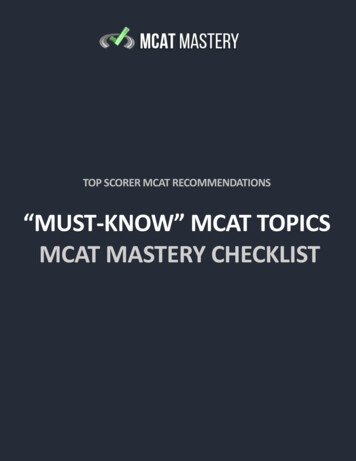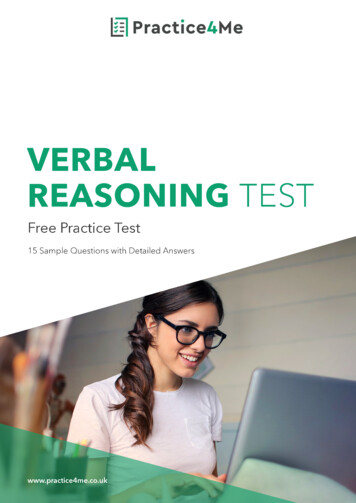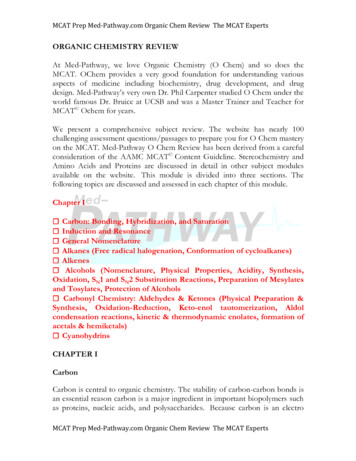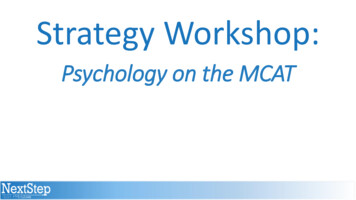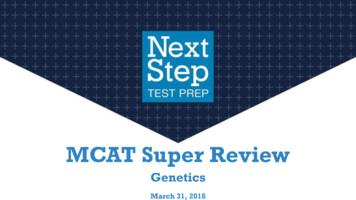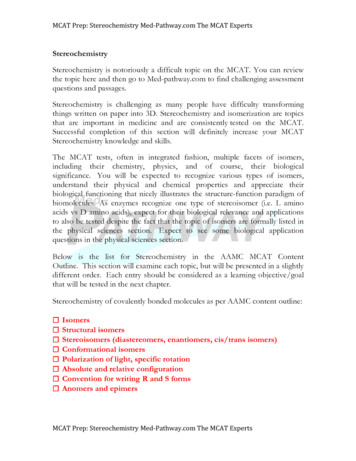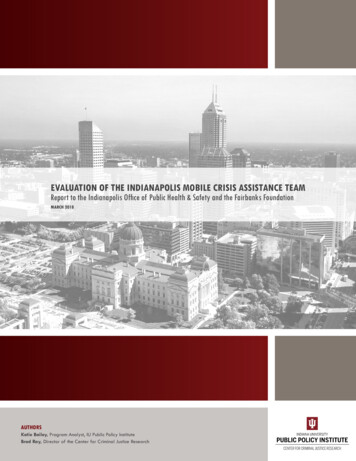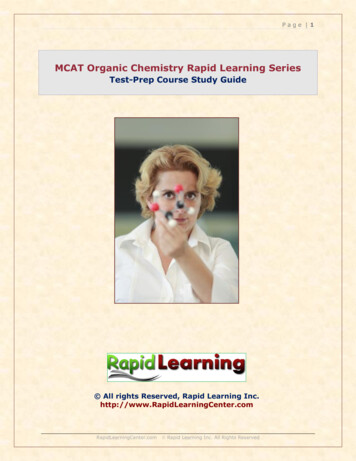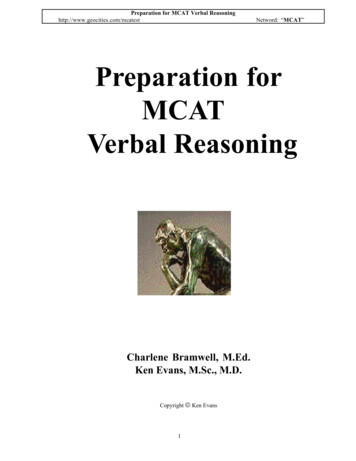
Transcription
Preparation for MCAT Verbal Reasoninghttp://www.geocities.com/mcatestNetword: MCAT Preparation forMCATVerbal ReasoningCharlene Bramwell, M.Ed.Ken Evans, M.Sc., M.D.Copyright Ken Evans1
Preparation for MCAT Verbal Reasoninghttp://www.geocities.com/mcatestNetword: MCAT PrefaceThe MCAT verbal reasoning section is at least as important as any other section of the MCAT. Itaccounts for one-third of your composite score. However, many MCAT candidates are uncertain asto how to prepare for it. As a result, this area is often neglected and candidates are often disappointedwhen they receive their MCAT scores. This book will help prepare candidates for the verbalreasoning section.Verbal reasoning is a skill and so requires practice to be good at it. Further, a systematic approachto developing this skill will make maximum use of a candidate s time. This book is based on thesetwo premises: it provides a great deal of practice and its approach is systematic. It first explains thetypes of questions one will encounter and the logic used to answer them. Test-taking techniques arealso described. Then it provides twelve warm-up passages and seventy MCAT-like passages forextensive practice. As your skills develop, you should impose time limits for each passage so thatyou become faster and accustomed to the kind of pressure you will face in the MCAT exam.The passages approximately progress from relatively easy to relatively difficult. If you find theearlier passages too easy, you can make them more challenging by giving yourself less time tocomplete them. This develops speed, which is crucial in the MCAT verbal reasoning sub-test.This book is offered through the internet for two reasons:1. There are no printing and shipping costs so the price can be set low.2. Potential buyers can test-drive before purchase.If you decide to use this book, please send a check or money order for U.S. 5, or the equivalentCanadian or Australian amount, made out to Ken Evans. Also include your e-mail address so wecan send you the answers and explanations. Please send to the address indicated at http://members.tripod.com/mcatest/order.htmlWe are confident that this book will help you to achieve a higher verbal reasoning score. Thank you for yourinterest in this publication and good luck on the MCAT.Charlene BramwellKen EvansCover: The Thinker. This statue was sculpted by Auguste Rodin (1840-1917) in Paris between 1879 and 1900.2
Preparation for MCAT Verbal Reasoninghttp://www.geocities.com/mcatestNetword: MCAT ContentsPreface.2Contents.3Chapter 1Types1.11.21.31.41.5of Questions.4Main Idea Questions.4Inference Questions.8Analysis of Evidence Questions.10Implication Questions.10Tone Questions.12Chapter 2Test-taking Techniques.15Chapter 3Warm-up Exercises.16Chapter 4Verbal Reasoning Exercises.203
Preparation for MCAT Verbal Reasoninghttp://www.geocities.com/mcatestChapter 1Netword: MCAT Types of QuestionsThe following is a list of typical questions you can expect to find on the Verbal Reasoning section of theMCAT.Main idea questionsThese test your comprehension of the theme of the article. Questions may ask you for the main idea,central idea, purpose, a possible title for the passage, and so on. You may be asked to determinewhich statement best expresses the author s arguments or conclusions.Inference questionsThese require you to understand the logic of the author s argument and then to decide what can bereasonably inferred from the article and what cannot be reasonably inferred.Analysis of evidence questionsThese ask you to identify the evidence the author uses to support his argument. You may be requiredto analyze relationships between given and implied information. You may be asked not only to understandthe way the author uses different pieces of information but also to evaluate whether the author has builtsound arguments.Implication questionsYou may be asked to make judgements about what would follow if the author is correct in his argumentor what a particular discovery might lead to. You may be given new information and then asked howthis affects the author s original argument.Tone questionsYou may be asked to judge the attitude of the author towards his subject.1.1Main Idea QuestionsTo find the main idea, ask the following three questions.What is this passage about (the topic)?What is the most important thing the author says about the topic (the main idea)?Do all of the other ideas in the passage support this main idea?Read the following passage and find the main idea.For most immigrants, the journey to America was long and often full of hardships and suffering. Theimmigrants often walked the entire distance from their villages to the nearest seaport. There the shipsmight be delayed and precious time and money lost. Sometimes ticket agents or ship captains fleecedthe immigrants of all they owned.4
Preparation for MCAT Verbal D.Netword: MCAT most important idea in this paragraph is:Immigrants had to walk long distances to get to seaports.Ship schedules were very irregular.Ship captains often stole all the possessions of immigrants.The journey of immigrants to America was very difficult and often painful.What is this passage about? This paragraph is about the immigrants journey to America. This is the topic ofthe paragraph.What is the most important thing the author says about the topic? The author says that the immigrants journey was long and often full of hardships and suffering. This is the main idea of the paragraph.To be absolutely sure that this is the main idea, ask yourself: Do all of the other ideas in the passage supportthis main idea? There are other ideas in the paragraph, but each one is an example of some kind of hardshipsuffered by the immigrants. Thus, the correct choice is D.The Main Idea at the Beginning of a PassageDid you notice that the main idea was contained in the first sentence? Often the main idea is in the firstsentence.Read the following passage and find the main idea.Working conditions in the factories were frequently unpleasant and dangerous. A workday of 14 or16 hours was not uncommon. The work was uncertain. When the factory completed its orders, themen were laid off. Often the pay was inadequate to feed a man s family. This meant that often anentire family had to work in factories in order to survive.ThisA.B.C.D.paragraph is most concerned withdangerous and difficult working conditions in factories.the passage of child-labor laws.the lack of job security in early factories.the low pay scale of early factories.What is this passage about? The topic of the passage is working conditions in the factories.What is the most important thing the author says about these working conditions? Working conditions in thefactories were frequently dangerous and unpleasant.Do all of the other ideas in the passage support this main idea? All of the other sentences give examples ofdangerous or unpleasant working conditions.The correct choice is A.The Main Idea in the Middle of a PassageSometimes the main idea it is stated somewhere in the middle of a paragraph. That is why the three questionsabout the main idea are so helpful.5
Preparation for MCAT Verbal Reasoninghttp://www.geocities.com/mcatestNetword: MCAT What is this passage about? will help you focus on the main idea.What is the most important thing the author says about the topic? will point out the main idea.Do all of the other ideas in the passage support this main idea? will help you to be sure you have chosen themost important idea rather than one of the less important ideas.If you can answer these three questions, you will find the main idea no matter where it is placed in theparagraph.Read the following passage carefully and ask yourself the three key questions. Then answer the questionfollowing the passage.Many who had left the Catholic Church during the Protestant upheaval eventually returned to theiroriginal faith. However, the religious struggle of the sixteenth century destroyed the unity of WesternChristendom. No longer was there one Church, nor one people, or one empire.TheA.B.C.D.main point the author makes in this paragraph is that:The Protestant Reformation destroyed the Catholic Church.The Protestant Reformation did not affect the Catholic Church.Some Protestants rejoined the Catholic Church.Western Christendom was never again unified after the Protestant Reformation.The topic is the Protestant upheaval. The most important thing the author says about the Protestant upheavalis that it destroyed the unity of Western Christendom. The first sentence gives an example of unity. Thesecond sentence points out that this example of unity was of very minor importance compared to the disunity.The third sentence expands this idea of disunity and tells how extensive the disunity was. The main idea iscontained in the second sentence. All of the other ideas support that sentence. Thus, the correct choice is D.The Main Idea in Several SentencesThe main idea is not always contained in a single sentence. Sometimes it takes more than one sentence toexpress a complex idea. Then you must piece together ideas from two or more sentences to find the main idea.The three questions are particularly helpful with paragraphs like this one:Locke, of course, was no lone voice. The climate was right for him. He was a member of theRoyal Society, and was thus intimately concerned with the work of the great seventeenth-centuryscientists. He argued that property the possession of land and the making of money was arational consequence of human freedom. This promise linked him to other great developments ofthe period the formation of the powerful banks, the agricultural revolution, the new science, andthe Industrial Revolution.The main idea of this paragraph isA. John Locke believed that property was a product of human freedom.B. John Locke was linked to the agricultural and industrial revolutions as well as to the newscience and the formation of banks.C. Property is the possession of land and the making of money.D. John Locke s views on property linked him to all the other great developments of theseventeenth century.6
Preparation for MCAT Verbal Reasoninghttp://www.geocities.com/mcatestNetword: MCAT You probably took a little more time to piece together the main idea. Notice that all of the choices are truestatements. All of them are found in the passage. But now you are asked to judge which is the most important.What is the passage about? The topic is John Locke. More precisely, the passage is about how John Lockewas linked to the great events of the seventeenth century.What is the most important thing the author says about John Locke and the events of his time? Locke s ideathat property was a natural result of human freedom linked him to the great developments of his period.Do all of the other ideas in the passage support your main idea? The first sentence says that Locke was not alone voice ; the second sentence says that the climate was right for him. These sentences support the ideathat Locke was linked to the developments of his period. The third sentence states explicitly that Locke was intimately concerned with the work of seventeenth-century scientists. The fourth sentence states Locke sideas on property (part of the main idea). The last sentence links Locke with the great developments of hisperiod (part of the main idea) and it lists those developments. Since all of the sentences in the paragraphsupport your statement of the main idea, you may be confident that you have the complete main idea. All of theother statements support the main idea, but they do not state it completely. Choice D is therefore correct.The Main Idea in Several ParagraphsSo far, you have learned to find the main idea of paragraphs. To find the main idea of passages consisting ofseveral paragraphs, first find the main idea of each paragraph. In the passage below, the main idea of eachparagraph has been underlined.Americans have long believed that George Washington died of injuries he received from a fall from ahorse. We now know that his doctors killed him. Oh, it was no political assassination. They killed himby being what they were physicians practicing good eighteenth-century medicine (which prescribedbleeding for every disease and injury). Washington, was bled of two quarts of blood in two days.It is commonly thought that the practice of blood-letting died with the eighteenth century, but eventoday leeches are sold in every major city in the United States. These blood-sucking little worms arestill used by ignorant people to draw off bad blood, the old-world treatment for every disease ofbody and spirit.The cities of America are infested with an even worse kind of bloodsucker than the leech. Like theleech, he is not a cure-all, but a cure-nothing. Like the leech, he transmits diseases more dangerousthan those he is supposed to cure. And like his brother, the primordial worm, he kills more often thanhe cures. His name is pusher ; his treatment is not bloodletting, but addiction.TheA.B.C.D.purpose of the passage is toexplain how George Washington died.describe the eighteenth-century practice of using leeches to treat diseases.denounce the practice of blood-letting.make a comparison between leeches and drug pushers.Re-read only the underlined portions of the passage. These sentences can be used to form a summary of thepassage:7
Preparation for MCAT Verbal Reasoninghttp://www.geocities.com/mcatestNetword: MCAT George Washington died of bleeding. Leeches are still used by ignorant people for treating diseases.The cities of America are infested with an even worse kind of blood-sucker than the leech. His nameis pusher. Now ask yourself the same questions you used to find the main idea of a single paragraph.What is the passage about? The topic is leeches, blood-letting, and drug pushers.What is the most important thing the author says about this topic? Drug pushers are worse than leeches and domore harm than blood-letting.Do all of the other ideas in the passage support this main idea? Yes, the first paragraph explains that leecheswere used in the eighteenth century and could kill people. The second paragraph explains that ignorant peoplestill use leeches. The third paragraph compares leeches and drug-pushers and stresses that drugs are the moreharmful.The answer is D.In addition to asking the three questions, you could also ask whether each of the answer choices is too narrowor too broad. For example, in the previous question choices A, B, and C are all too narrow to be the mainidea.1.2Inference QuestionsSome questions ask you to make inferences. An inference is a conclusion not directly stated in the text, butimplied by it. Read the following passage. The topic is not directly stated, but you can infer what the paragraphis about.Dark clouds moved swiftly across the sky blotting out the sun. With no further warning, great cracksof thunder and flashes of lightning disturbed the morning s calm. Fortunately, the deckhands hadalready tied everything securely in place and closed all portholes and hatches or we would have lostour gear to the fury of wind and water.1. This passage most likely describesA. a storm during an African safari.B. a storm at sea.C. an Antarctic expedition.D. a flash flood.2. Which of the following statements is false?A. The storm was unexpected.B. The storm came suddenly.C. It was windy.D. It was cloudy.Nowhere in the paragraph are the words sudden storm at sea but, obviously, that is what the paragraph isabout. The words dark clouds, thunder, lightning, wind, and water all suggest a storm. The word deckhandssuggests a ship at sea. Several other words give you the feeling of the suddenness of the storm. You arejustified in inferring that the writer was caught in a sudden and terrible storm at sea. The answer to question1 is B.8
Preparation for MCAT Verbal Reasoninghttp://www.geocities.com/mcatestNetword: MCAT But are you justified in concluding that the storm was unexpected. You know that things that happen suddenlyare often unexpected. Was that the case with this storm? The last sentence tells you that the deckhands hadalready tied everything down and closed all portholes and hatches. That sentence indicates the storm wasexpected. The answer to question 2 is A.Read the paragraph below. You will be asked to examine the cause-effect relationships implied by it later.Bo went to the play-off game with several of his friends. At the stadium Bo ate four frankfurters withmustard and relish, two hamburgers with chilli, drank several bottles of soda, and ate an assortment ofcandy, potato chips, pretzels, and ice cream. Suddenly Bo felt dizzy, feverish, and sick. When he gothome, he took something to calm his stomach and went to bed.Bo got sick becauseA. he took something to calm his stomach.B. he went to the play-off game.C. he felt dizzy and feverish.D. he ate too much.It is easy to see that Bo got sick because he ate too much choice D. What is wrong with the other answers?Choice A is wrong because the cause and effect are mixed up. Bo took something to calm his stomach becausehe was sick. He was not sick because he took something to calm his stomach.Choice B is wrong because going to the play-off game really had nothing to do with his nausea later. If he hadeaten the same food at home, he probably would have been just as sick. There is no real causal connectionbetween the game and the sickness.Choice C is incorrect because the feverishness and dizziness probably had the same cause as Bo s sickness.They were signs or symptoms of his illness, but not its cause.Read the following paragraph. The question following it is concerned with the relationships between the mainidea and supporting details.Do we live in a revolutionary age? Our television and newspapers seem to tell us that we do. The latetwentieth century has seen the governments of China and Cuba, among others, overthrown. Thecampuses of our universities erupted into violence; above the confusion of voices could be heardslogans of social revolution. We are constantly reminded that we live in a time of scientific andtechnological revolution. Members of militant racial groups cry for the necessity and inevitability ofviolent revolution. Even a new laundry detergent is described as revolutionary! Many causes,many voices, all use the same word.Revolutionary ages are generally marked by:A. violence, slogans, science.B. violence, television coverage, governments overthrown.C. peace, science, technology.D. violence, confusion, governments overthrown.Notice that the author does not answer his own question in the first sentence (the main idea). All of the othersentences give illustrations of or examples of revolution. The question asks you to make a generalizationabout9
Preparation for MCAT Verbal Reasoninghttp://www.geocities.com/mcatestNetword: MCAT the nature of revolution from these examples. Choices A and B include examples from a particular revolution(if one does exist). They are not true generalizations. Choice C is patently contrary to the ideas of thepassage. Choice D is correct.1.3Analysis of Evidence QuestionsSome questions ask you to check back in the text to see if the passage confirms or refutes a particular detail.This is the easiest kind of question to answer. In fact, the answer may be so obvious, you may be tempted tofeel that some kind of trick is involved. Relax! If you can find the answer in the passage, you are almostcertainly right.The Fertile Crescent has been called the cradle of civilization. The Fertile Crescent is that sickle-shapedarea of land between the Tigris and Euphrates rivers. The waters of these rivers changed the Asiandesert into rich land with abundant crops. Many people believe that this is the land where man firstsettled down to farming after ages as a wandering hunter and later as a herder. Some even believe thatthe fabulous Garden of Eden was located somewhere in the Fertile Crescent.1. The Fertile Crescent is located inA. Africa.B. Europe.C. Asia.D. the west.2. A crescent isA. shaped like a sickle.B. always fertile.C. round.D. deserted.3. TheA.B.C.D.land between the Tigris and Euphrates rivershas good soil and abundant water for irrigation.is populated by hunters.was extremely overpopulated.is shaped like a full moon.ANSWERS1.C is correct 3rd sentence.2.A 2nd sentence.3.A 3rd sentence.1.4Implication QuestionsSometimes you will have to apply one of the ideas in a passage to another situation. Sometimes this type ofquestion takes a broad generalization from the passage and asks you to apply it to a specific situation. Attemptthe passage below.In December 1946, full-scale war broke out between French soldiers and Viet Minh forces. Thepeople tended to support the Viet Minh. Communist countries aided the rebels, especially after 194910
Preparation for MCAT Verbal Reasoninghttp://www.geocities.com/mcatestNetword: MCAT communist regime came to power in China. The United States became involved in the struggle in1950, when the United States declared support of Vietnamese independence, under Bao Dai.Finally, in 1954, at the battle of Dien Bien Phu, the French suffered a shattering defeat and decided towithdraw. The 1954 Geneva Conference, which arranged for a cease-fire, provisionally divided Vietnaminto northern and southern sectors at the 17th parallel. The unification of Vietnam was to be achievedby general elections to be held in July 1956 in both sectors under international supervision. In thenorth, the Democratic Republic of Vietnam was led by its president, Ho Chi Minh, and was dominatedby the Communist party.In the south, Ngo Dinh Diem took over the government when Bao Dai left the country in 1954. As theresult of a referendum held in 1955, a republic was established in South Vietnam, with Diem asPresident.1. A good title for this passage would be (main idea question)A. The United States and Vietnam B. The Geneva Conference C. The Vietnamese Fight for Independence D. The Career of Bao Dai 2. In the second paragraph the word provisionally means (implication question)A. temporarily.B. permanently.C. with a large, outfitted army.D. helplessly.3. Bao Dai was in 1950 (implication question)A. a possible Vietnamese independence leader.B. the leader of the French.C. the brother of Dien Bien Phu.D. the President of South Vietnam.4. The tone of this passage is (tone question)A. objective.B. partial to the French.C. partial to the North Vietnamese.D. cynical.5. From the passage we might assume that in 1946 the Viet Minh were (implication question)A. South Vietnamese.B. Vietnamese rebels.C. North Vietnamese.D. French-supporting Vietnamese.ANSWERS1.C2.A3.D4.A5.B11
Preparation for MCAT Verbal d: MCAT Tone QuestionsAn author may express his feelings or attitudes toward a subject. This expression of emotion imparts a tone tothe writing. To determine the tone of a passage, think of the emotions or attitudes that are expressed throughoutthe passage.Below are some terms used to describe ul, approvingmaking small, depreciatingunbelieving, sneeringblackening, defamatoryinstructive, authoritarianexuberant, praisingsatirical, making fun ofpraisinguntruthful, lyingfactualhopefulcommending, laudatoryexhalted, regarding as sacredderiding, mocking, scornfulsorrowful, mournfulconfident, hopefulbitter, ironicmocking, bitter, cynicalridiculing, mockingsadA tragic tone reflects misfortune and unfulfilled hopes. A satiric tone mocks and ridicules its subject. Anauthor may use an ironic tone to develop a contrast between (1) what is said and what is meant, (2) whatactually happens and what appears to be happening, or (3) what happens and what was expected to happen.These are just a few of the emotions or attitudes that influence the tone.Attempt the questions below.A certain baseball team took the pennant for the first time in many years. Different people reacteddifferently.1. Wow! I can t believe it! This is the best thing that could have happened in this city! The tone of this remark isA. serious.B. excited.C. sarcastic.D. amazed.12
Preparation for MCAT Verbal Reasoninghttp://www.geocities.com/mcatestNetword: MCAT 2. Ah! This is like it was when I was a boy. It makes my chest swell with pride again and bringstears to my eyes. The tone of this remark isA. sentimental.B. excited.C. sarcastic.D. amazed.3 . The team s manager and coach have had a lot of influence throughout the season. Theydeserve a lot of credit for this victory. The tone of this remark isA. serious.B. excited.C. sarcastic.D. amazed.4. What!? They won!? And they started off so poorly this season. I just can t believe it! The tone of this remark isA.B.C.D.serious.excited.sarcastic.amazed.5. It couldn t have been skill since they don t have that. It couldn t have been bribery, since theydon t have any money. The other team must all have been sick. It s the only way they couldhave won. The tone of this remark 1.B.2.A.3.A.4.D.5.C.We sat around the fire in the old house. My brothers and I and our father hadn t all been together fora year. It was a cold November day. Only a year had passed. Mother s shawl still hung over the backof her rocker. It had hung there that night a year ago. It hung there quietly just as her memory hungin our minds. We tried to talk, but silence kept breaking in - the silence of the rocker that creaked nomore. We four shared the silence of the rocker.1.The tone of this passage isA. humorous.B. hopeless.C. satiric.D. sentimental.13
Preparation for MCAT Verbal Reasoninghttp://www.geocities.com/mcatestNetword: MCAT ANSWER1.D.A student was arrested for auto theft. His friends reacted in various ways.1. John has been arrested? I m afraid he is headed downhill. This is not the first time. Each timeit gets worse. I m worried about him. The tone of this isA. angry.B. fearful.C. sarcastic.D. surprised.2. Go on, John! Soon you ll be able to steal a cookie without your mother knowing it. The tone of this isA. praising.B. happy.C. sentimental.D. sarcastic.3. Damn that boy! Won t he ever straighten up. The tone of this isA. depressed.B. angry.C. sarcastic.D. serious.4. He s never been arrested before. Maybe, God willing, this will teach him his lesson. I see abetter day coming. The tone of this isA. hopeful.B. hopeless.C. sentimental.D. saddened.5. I showed him just how to do it. He blew it! He could have gotten away with it if he d justlistened to me. The tone of this isA. disappointed.B. hopeless.C. depressed.D. sarcastic.ANSWERS1.B.2.D.3.B.4.A.5.A.14
Preparation for MCAT Verbal Reasoninghttp://www.geocities.com/mcatestChapter 2Netword: MCAT Test-taking TechniquesThe Verbal Reasoning section of the MCAT not only tests your comprehension and reasoning abilities, it alsotests how fast you can read. Most candidates will have little or no time to go back and check their answers;and many will not even be able to finish all the passages.If your reading rate is less than 300 words a minute you may have difficulty completing the section. You cancompute your reading rate by reading for a minute and counting the number of words read (approximateaverage line length x number of lines). If you are a slow reader you should try to improve your reading speed.There are various books and courses that teach how to read faster try consulting a library.Your task during the MCAT exam is to correctly answer the questions not to understand perfectly thepassages. The purpose of the techniques described below is to enable you to answer the questions with theminimum amount of time.You may want to select one of these techniques or develop one of your own. You are encouraged to trydifferent techniques under test conditions (i.e. 8 to 9 minutes per passage, including questions) to determinewhich technique you prefer, then you should practice using it.Technique 1Read the entire passage answer the questions.This requires the most ability to understand complex relationships and retain details while you arereading at a fast rate.Technique 2Read the first two paragraphs read all the questions and answer those you can read the remainderof the passage, answering the questions as you go along.Technique 3Read the first sentence of each paragraph read the question stems read the entire passage,answering the questions as you go along.Technique 4Read the question stems read the entire passage, answering the questions as you go along.15
Preparation for MCAT Verbal Reasoninghttp://www.geocities.com/mcatestChapter 3Warm-up ExercisesNetword: MCAT 2 . What kind of life did the Plains Indians lead?A.They wandered with the buffaloes.B.They led comfortable and ideal lives.C.They spent their lives in one place.D.They lived in large, airy caves.These short, relatively easy passages will helpconsolidate the principles and techniques explainedin Chapter 1.ANSWERS1.D2.AAs the mid-century approache
The MCAT verbal reasoning section is at least as important as any other section of the MCAT. It accounts for one-third of your composite score. However, many MCAT candidates are uncertain as to how to prepare for it. As a result, this area is often neglected and candidates are often disappointed when they receive their MCAT scores.

